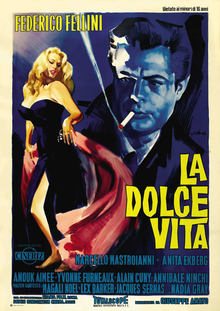
Back La dolce vita AN لا دولشي فيتا (فيلم) Arabic لا دولشى فيتا ARZ Şirin həyat (film, 1960) Azerbaijani تاتلی حیات (فیلم، ۱۹۶۰) AZB Салодкае жыццё Byelorussian Сладък живот Bulgarian লা দোলচে ভিতা Bengali/Bangla La dolce vita Catalan Sladký život (film, 1960) Czech
| La dolce vita | |
|---|---|
 Italian theatrical release poster by Giorgio Olivetti | |
| Directed by | Federico Fellini |
| Screenplay by |
|
| Story by |
|
| Produced by | |
| Starring | |
| Cinematography | Otello Martelli |
| Edited by | Leo Catozzo |
| Music by | Nino Rota |
Production companies |
|
| Distributed by |
|
Release dates |
|
Running time | 174 minutes |
| Countries |
|
| Languages |
|
| Box office |
|
La dolce vita (Italian: [la ˈdoltʃe ˈviːta]; Italian for 'the sweet life' or 'the good life'[2]) is a 1960 satirical comedy-drama film directed by Federico Fellini. It was written by Fellini, Ennio Flaiano, Tullio Pinelli, and Brunello Rondi. The film stars Marcello Mastroianni as Marcello Rubini, a tabloid journalist who, over seven days and nights, journeys through the "sweet life" of Rome in a fruitless search for love and happiness. The screenplay can be divided into a prologue, seven major episodes interrupted by an intermezzo, and an epilogue, according to the most common interpretation.[3]
Released in Italy on 5 February 1960, La dolce vita was both a critical success and worldwide commercial hit, despite censorship in some regions. It won the Palme d'Or at the 1960 Cannes Film Festival[4] and the Academy Award for Best Costumes.[5] It was nominated for three more Oscars, including Best Director for Federico Fellini, and Best Original Screenplay. Its success proved a watershed moment for Italian cinema and European cinema-at-large,[6] and it has come to be regarded as a masterpiece of Italian cinema and one of the greatest films of all time.[7]
In 2008, the film was included on the Italian Ministry of Cultural Heritage’s 100 Italian films to be saved, a list of 100 films that "have changed the collective memory of the country between 1942 and 1978."[8]
- ^ "La Dolce Vita de Federico Fellini (1960)". UniFrance. Retrieved 19 November 2019.
- ^ Kezich, 203
- ^ Cf. Bondanella 1994, p. 143 and Kezich, p. 203
- ^ "Festival de Cannes: La Dolce Vita". festival-cannes.com. Archived from the original on 18 January 2012. Retrieved 15 February 2009.
- ^ Pettigrew, 169
- ^ Bondanella, Peter; Pacchioni, Federico (19 October 2017). A History of Italian Cinema. Bloomsbury Publishing USA. ISBN 978-1-5013-0765-2.
- ^ "Critics' top 100". BFI. Archived from the original on 7 February 2016. Retrieved 5 September 2020.
- ^ "Ecco i cento film italiani da salvare Corriere della Sera". www.corriere.it. Retrieved 11 March 2021.